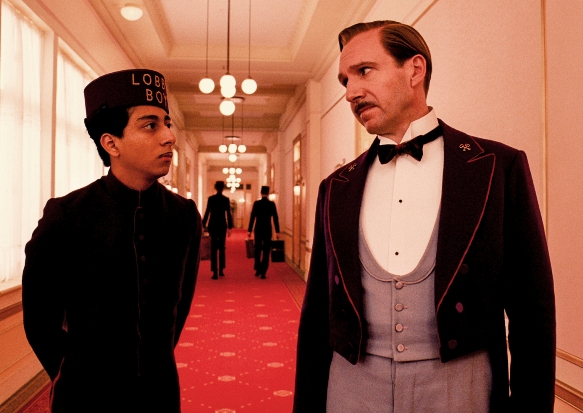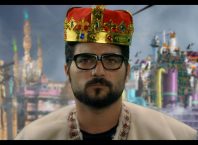There is only one story, and it always ends in death. Somewhere in the middle, if we’re lucky, there might be love, and life in the telling.

Wes Anderson is a filmmaker who knows how to tell a story. The Grand Budapest Hotel is magnificent! Sumptuous, elegant, amusing and suspenseful, with a cast as large as life itself, it is a film that not only gives, but understands pleasure. There is a story, a good one, a story that takes its time and does not skimp on a single, luscious, quirky detail.
Hotels are one of those places where one is not meant to linger, it was always intended as a place of temporary respite and refuge. People come and go, their stories remain, and it is always a good idea to befriend the concierge. Or the lobby boy, for that matter.
The Grand Budapest Hotel is an homage to Old World Elegance, courage, poetry, fidelity, panache and old-fashioned storytelling, evoking a time when the word “grand” was a quality to which one might aspire. It is not so much a portrayal of a world long gone, but rather the desire to imagine that such a world ever existed. Painful, sad, and even brutal events may take place, yet these are all encompassed within a world that cherishes friendship, laughter, and exquisite style.
Every character one encounters in this tall tale of Zubrowka is a portrait of veracity verging on bizarre, like the Countess D.’s (Tilda Swinton) mile high coiffure, at once familiar and yet utterly surprising. Merging comic hyperbole with an unerring sense of dignity, Anderson lets us care about these flawed, awkward, lost characters in earnest pursuit of happiness, wealth, sex, or whatever else they may seek. Every single performance in this film is astonishing, like the most elaborate confection in a bakery window, there is perfection even in the smallest detail; the most fleeting moment leaves an impression. M. Gustave (Ralph Fiennes) is one of the unlikeliest likeable heroes ever: rogue dandy as mentor. His sidekick, new lobby boy Zero, marks the debut of Tony Revolori, whose expressive eyes and deadpan delivery define the strange and wonderful heart of this film.
From the red carpeted lobby of glory days, to the lurid orange elevators of the late 60s, the design is so enticing! It tells a visual story so powerful that one could almost watch the film without the sound. Playing with symbolism and metaphor for the viewer’s pleasure, The Grand Budapest Hotel conveys layers of meaning without the weight of self-indulgence.
Surreal, silly, beautiful, sad and strange, The Grand Budapest Hotel is nothing at all like real life, and exactly like the truth.
The Grand Budapest Hotel
(USA/UK/Germany, 2014, 100min, English with Hebrew subtitles)
Director: Wes Anderson; Screenplay: Wes Anderson; Story: Wes Anderson, Hugo Guiness; Cinematography: Robert Yeoman; Music: Alexandre Desplat; Editing: Barney Pilling; Cast: Ralph Fiennes, Tony Revolori, F. Murray Abraham; Edward Norton, Willem Dafoe, Jude Law, Owen Wilson, Léa Seydoux, Bill Murray, Adrien Brody, Tilda Swinton, Saoirse Ronan





